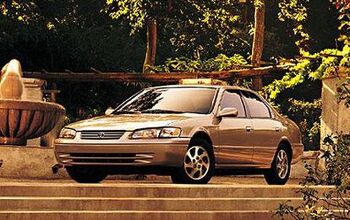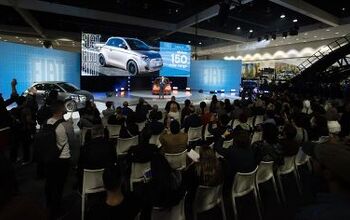Hammer Time: Quality Work
Yesterday I sold a 1992 Lexus LS400. It was a well kept model with all the bells and whistles for it’s time. Hands-free cell phone. 250 horsepower V8. Sunroof, ABS, plenty of wood interior accents. For 195,000 miles it was a really great car. At the time it drove off I was speaking to a journalist from Reuters who was covering the Toyota recall. A mental somersault happened at that very moment. While I watched the Lexus pull away and kept on discussing the industry wide battle to contain costs, I looked at a few of my older cars. A 1993 Town & Country, still in great condition. A 1995 Cavalier that could easily go another eight to ten years. A 1997 Pontiac Sunfire Convertible that still drove like it was virtually new. Three cars. All of which were of seemingly dubious reputations for their time all had a good shot of hitting the big 20. I realized something in that very moment…
Only exports will guarantee the viability of the American auto industry. Consider this… not only is our market saturated, it has been bequeathed with unsustainable levels of financing, rental subsidies, and accounting games for over a decade. No matter what ‘clunker’ driven legislation is passed today we still will have way too many high quality used cars in today’s market that can be bought for $2,500 instead of $25,000. It’s great for the cash strapped consumer (and amen to that). But a barnacle bitch for the auto industry and their employees.
Consider the problem that Honda now has with their loyal and loving ‘repeat’ customers. The 2010 Accord may be far better than a 1999 Accord. But it doesn’t matter. That 11 year old model benefited from a time in history where long-term quality took a quantum leap. It still gets the job done extremely well and can still compete with it’s larger progeny when it comes to comfort and fuel economy.
Unfortunately for today’s car makers, a comparable and far cheaper product ends up being the product of choice in tough times. Security and ‘good enough’ are all most people really care about in a long and nasty recession. Tomorrow may be a cloud of fear and anxiety. But keeping things the same with cars and all other big ticket items helps quell this fear. Pork barrels have historically been the inducement du jour for this. Subsidize the consumer with cash and he or she will tilt their feelings toward the windmills of hope and greed. However, the only healthy way to get out of this fearful mindset is through knowledge and confidence. Simply put… you need freedom to innovate and find ‘the better way’. Consider for example all the innovations that made even the lowliest of vehicles… enduring.
The early to mid 1990’s were a paradigm shift in the auto industry. Suppliers became far fewer which greatly improved the automaker’s ability to design and manufacture the final product. Quality standards became exceptionally more strict. You had everything from Six Sigma to CAD/CAM Design to Moore’s law yielding an entirely new way to communicate and do business. The result was that nearly every competitor in the industry built better cars using better materials. Lean manufacturing, once a Japanese only assembly process, became the de-facto standard for all North American assembly plants. Everyone from the assembly line worker to the engineer had better tools and greater freedom to exercise them. The end result?
The fifteen year old car is no longer a clunker. It’s just another car. In fact portions of that car were likely designed to take on the best in the business at that time. The engine of a Chrysler LH sedan was designed to compete with the Acura Legend. Ford tried to take on the Toyota with the Taurus. Even Toyota learned a few things from the successes of a simple design like the Dodge Neon. Everybody took off the blinders and started cribbing each other’s notes and collectively spent over $100 billion+ on R&D. These industry-wide efforts resulted in windfall profits, high levels of employment in the United States, and vehicles that could endure longer than anyone cared to admit. The pursuit of knowledge was well invested and well rewarded.
Then the lazy time came. Why chase market share and spend billions on a new design when you could just buy someone else’s? The good ideas at Volvo were swallowed by Ford. BMW, Mercedes and VW all decided that foreign automakers could easily be acquired and taken over as subordinates. Even the Japanese embraced the conglomerate religion with Nissan joining Renault. Mazda joining Ford, and poor Mitsubishi finding itself between a hollowed out Chrysler and a hyper-arrogant and deceitful Mercedes management. Economies of scale and platform sharing became the standard which ended up being absolutely devastating in the long-term. The reason?
When everyone uses similar companies to engineer similar products in similar ways, it all becomes a sea of vanilla. Today’s cars all offer the same ‘cheats’ with oversized tires, plasticized interiors garnished with tin thin aluminum, and electronics that often have little to no point for most consumers (push button start, drive-by wire, manumatics that are never used.) The Camry, Sonata, Optima, Accord, and Malibu all drive like a Buick. Which is fine… except that you can buy a perfectly good 2000 Buick with about 100k on it for $3500. That car will also drive like a Buick for at least five more years if not longer.
So what does this mean? The American auto industry will only get out of this malaise of decontenting and copycatting by competing in markets and segments that now seem ‘foreign’. The ultra-cheap commuter is vital to the development of foreign markets. The idea of ‘luxury’ is still a nebulous one in most emerging markets. Competitors in the North American market will not be able to survive from profit alone here… because there’s very little profit to be had in America. We can only succeed by exploring new cultures and ideas… and putting the lazy ones that brought us here to rest. Disagree? Well consider how Hyundai became so successful in the United States. Think it over and as they say in the Green Mountains of northern Vermont, “Weigh it in.”
More by Steven Lang
Latest Car Reviews
Read moreLatest Product Reviews
Read moreRecent Comments
- Michael S6 Welcome redesign from painfully ugly to I may learn to live with this. Too bad that we don't have a front license plate in Michigan.
- Kjhkjlhkjhkljh kljhjkhjklhkjh A prelude is a bad idea. There is already Acura with all the weird sport trims. This will not make back it's R&D money.
- Analoggrotto I don't see a red car here, how blazing stupid are you people?
- Redapple2 Love the wheels
- Redapple2 Good luck to them. They used to make great cars. 510. 240Z, Sentra SE-R. Maxima. Frontier.


































Comments
Join the conversation
I've always driven older European cars. I am an experienced DIY mechanic and will tackle pretty much anything short of an engine rebuild in my lift-equipped garage. But you know what? Last year I bought myself a brand-new Saab. 11 miles on it. Couldn't pass up the $13K discount, and frankly at 41 I am tired of wrenching on my daily drivers. And I have a great job, single, and no kids so I deserved it! :-) I'll keep it long enough and well enough that I won't lose too much money on it when I sell it on, and it sure is nice to have a new car with no issues. Now I have more time to wrench on my toys - heading out to the garage to work on my "new" Alfa Spider in a few minutes.
The new car buyers will always be new car buyers. i'm the used car manager at a Mercedes Benz dealer. From the consumer shopping chevy malibus all the way up to a gentleman looking for a bentley the people who used to buy new cars will still buy them. In my opinion, the idea of the older 8+ year old cars makes little sense anyways. Repairing modern automobiles is expensive. I've had tons of cars over the years and only bought(as in retail purchase not lease) new once. i've had my 2000 audi s4 since new and I love the car. I've owned cars that are much "better"-more expensive, faster, more luxurious etc. but I have never gotten rid of the audi. but it makes absolutely no since to keep it. In 2009 alone I spent a lot more on repairs than the car is even worth. Over the course of ownership I've probably spent almost as much as the 40K it cost to purchase bakc in 2000. But to me its a great car its still my favorite sedan looks wise and its fun and I always drive it when the weather is shitty. Your average american doesn't love their car as much as I love that beat up old audi. While a car like a honda accord may have cheper repairs and need them less frequently, its still not rare to have $1000 plus dollars repairs on a modern car come up from time to time over the course of ownership. These add up quickly and it really makes much more sense to own a new car or a car with the balance of facroty or certified warranty.